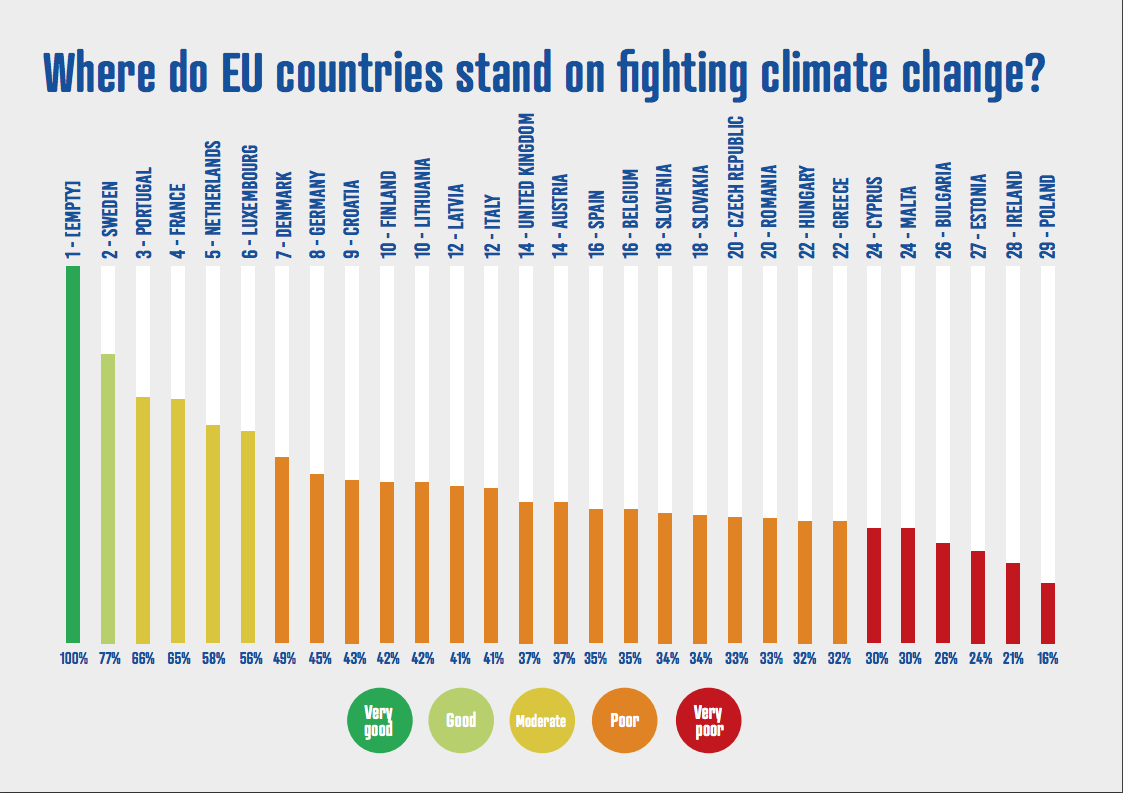The majority of countries in the EU are lagging behind when it comes to reducing carbon emissions to the level set out by the Paris Agreement, and too many are lacking ambition in setting climate and energy targets and policies, finds Climate Action Network (CAN) Europe.
In its latest report, titled Off target: Ranking of EU countries’ ambition and progress in fighting climate change, Europe’s NGO coalition on climate change presents a new ranking of EU countries, divided into three groups. It notes that the top position on the list remains unoccupied.
The five EU countries that scored the highest are: Sweden (77%), Portugal (66%), France (65%), the Netherlands (58%) and Luxembourg (56%), on the back of advocating more ambitious climate targets at the EU level.
Meanwhile, among all the countries CAN Europe labels as “the good” still need to work much harder on reducing emissions and promoting renewable energy and energy efficiency at home.
Further down the chart comes a group of “the bad” countries, including Denmark (49%), Germany (45%), the U.K. (37%) and Belgium (35%).
Once champions in fighting climate change, they ended up scoring less than 50% in the latest rankings, for aiming too low despite their relative wealth, says CAN Europe.
The group dubbed “the ugly' comprises countries that remain unambitious when it comes to climate policies, with Estonia (24%), Ireland (21%) and Poland (16%) at the very bottom of the list.
“While all EU countries signed up to the Paris Agreement, most are failing to work towards delivering on its objectives. Countries urgently need to improve their ranking by speaking out and acting in favor of more ambitious climate and energy policies and targets domestically and at EU-level,” said Wendel Trio, Director of CAN Europe.
The indicators taken into consideration when drafting the ranking were: overall performance on climate and energy indicators, such as per capita greenhouse gas emissions or share of renewable energy; progress on implementation of the 2020 targets; domestic targets additional to the EU targets; support for higher ambition in EU 2030 climate and energy legislation and support for more ambitious 2030/2050 EU overall targets and policies.
The report came out at the start of a busy week for the EU climate officials. On June 18-19, Germany and Poland are co-hosting the ninth Petersberg Climate Dialogue in Berlin, which will bring together representatives from 35 countries.
On June 20-21, meanwhile, the Ministerial on Climate Action (MoCA), held by the EU, Canada and China will take place in Brussels, ahead of a meeting of EU environment ministers on June 25.
Overall, the CAN Europe ranking comes at a decisive time for the adoption of 2030 energy legislation and hot on the heels of the EU call to raise renewable energy targets from 27% to 32% by 2030, and amid preparations for the next climate summit COP24 in Katowice, Poland, in December this year.
This content is protected by copyright and may not be reused. If you want to cooperate with us and would like to reuse some of our content, please contact: editors@pv-magazine.com.




By submitting this form you agree to pv magazine using your data for the purposes of publishing your comment.
Your personal data will only be disclosed or otherwise transmitted to third parties for the purposes of spam filtering or if this is necessary for technical maintenance of the website. Any other transfer to third parties will not take place unless this is justified on the basis of applicable data protection regulations or if pv magazine is legally obliged to do so.
You may revoke this consent at any time with effect for the future, in which case your personal data will be deleted immediately. Otherwise, your data will be deleted if pv magazine has processed your request or the purpose of data storage is fulfilled.
Further information on data privacy can be found in our Data Protection Policy.